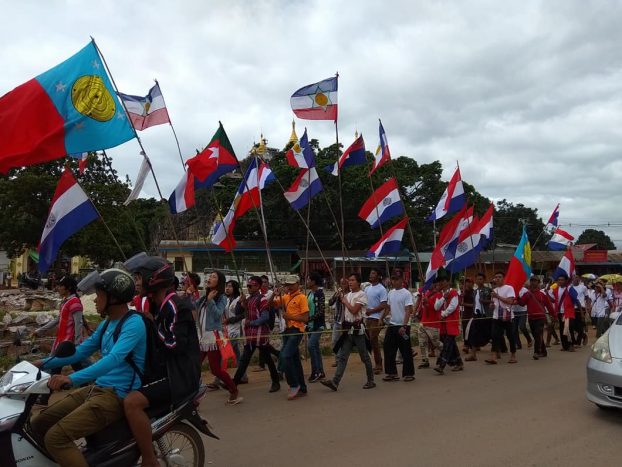Hundreds of people turned out Tuesday to protest a statue of General Aung San in the Karenni State capital Loikaw, the latest effort to commemorate a man widely regarded as Burma’s founding father that has run up against local resentment.
Coordinated columns of protestors set out Tuesday morning from multiple towns in Karenni State to converge on the state capital, where the bronze figure of Aung San is not yet completed but slated to be unveiled in time for Martyrs’ Day, which is marked annually on July 19.
Saya Thomas, secretary No. 2 of the Kayan New Generation Youth and an organiser of the protest, said Karenni State residents took to the streets after demands to meet with the state government to voice objection to the Aung San statue in Loikaw went unanswered.
Saya Thomas said the demonstration devolved into a “melee” with police who blocked the procession of marchers intent on reaching the park where the statue is located.
“We negotiated with police to allow us to march to the park. People were waiting under the hot sun for a long time to get permission. However, they [authorities] said they had to submit [the request] to their superiors. Finally, people couldn’t stand the situation anymore and it became a melee,” he told DVB.
“Police arrested one of the leaders and put him into a vehicle for prisoners. They handcuffed villagers involved in the protest, so we did a sit-in protest to have them released at once. They released our people. Then, we dispersed,” Saya Thomas continued.
Tuesday’s protestors identified their roots with ethnic minorities prevalent in the region, including the Karreni, Kayan and Gebar groups.
Their opposition to the Aung San statue is not the first of its kind to surface in recent years; similar resistance has emerged in other parts of the country with sizeable ethnic minority populations, such as Mon and Kachin states. Critics have spoken out against what they say are efforts to foist a reverence for Aung San on minority populations that have long decried the so-called “Burmanisation” of the collective national identity.
Pushback against perceived chauvinism of the majority-Bamar population arose in the earliest days of independence and has persisted ever since — a deeply engrained ethno-nationalist aspect of modern Burma that Aung San’s daughter, current de facto leader Aung San Suu Kyi, is struggling to contend with as she seeks to end decades of civil war.
And how best to honour Aung San’s legacy is likely to remain a sensitive topic in the years to come. Burma’s former military regime sought to minimise his place in public life, while recent efforts to do precisely the opposite are being met in some cases with the kind of blowback on display this week in Loikaw.
[related]
“Our Karenni State was independent originally. And all our different tribes have our own national leaders,” Saya Thomas said.
“We believe that building the statue of Bogyoke [Aung San], whom people from mainland [Burma] call the father of independence, in our state without recognising the images of the leaders we already have in the state amounts to an attempt to erase our history.”
He added, “If the Bogyoke statue is placed in our state while a common agreement has not been reached, then there would occur undesirable problems and consequences. … That’s why we protest.”
The Karenni State government has nonetheless pushed ahead with plans to consecrate the statue in Loikaw’s Kandar Hay Wun Park to coincide with Martyrs’ Day. The 15-foot-tall bronze equestrian statue was commissioned at an expected cost of 60 million kyats ($43,000).
With reporting by Naw Noreen



